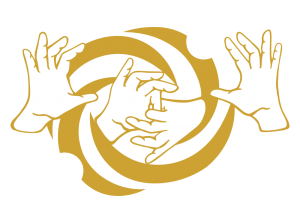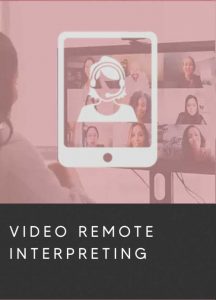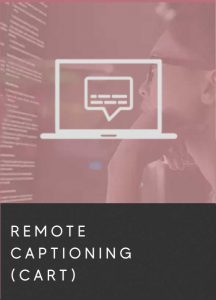 What should you look for when hiring sign language interpreters? Imagine rushing to the hospital because a family member has been injured, but when you arrive nobody can tell you what happened because you do not speak the same language. Sitting bedside, holding the hand of a loved one who is broken, bleeding and unconscious, you have no idea what occurred, what is going on, or whether they will be ok. Many hours later an interpreter finally arrives to provide communication, but they start interpreting things that don’t even make sense. Something about surgery for a basketball … test … later friendship? What? The interpreter is not effectively communicating the message from the doctors, which just results in more frustration and confusion during an already stressful situation.
What should you look for when hiring sign language interpreters? Imagine rushing to the hospital because a family member has been injured, but when you arrive nobody can tell you what happened because you do not speak the same language. Sitting bedside, holding the hand of a loved one who is broken, bleeding and unconscious, you have no idea what occurred, what is going on, or whether they will be ok. Many hours later an interpreter finally arrives to provide communication, but they start interpreting things that don’t even make sense. Something about surgery for a basketball … test … later friendship? What? The interpreter is not effectively communicating the message from the doctors, which just results in more frustration and confusion during an already stressful situation.
All Interpreting Agencies Are Not Created Equal
 Unfortunately it is still common for individuals with hearing loss to endure substandard ASL interpreting services provided by low quality interpreters. Because there is no mandatory national standard for requiring licensure and certification, poor interpreting services continue to deny Deaf individuals the ability to participate in conversations that impact their lives. Hiring unqualified interpreters is ultimately a waste of financial resources, and can open an organization up to potential violation of the Americans with Disabilities Act (ADA).
Unfortunately it is still common for individuals with hearing loss to endure substandard ASL interpreting services provided by low quality interpreters. Because there is no mandatory national standard for requiring licensure and certification, poor interpreting services continue to deny Deaf individuals the ability to participate in conversations that impact their lives. Hiring unqualified interpreters is ultimately a waste of financial resources, and can open an organization up to potential violation of the Americans with Disabilities Act (ADA).
A person who is hiring sign language interpreters for the first time may not be sure what to look for in a provider or agency. Ensuring quality interpreting services for Deaf individuals can be especially challenging to those who do not know American Sign Language and are unfamiliar with Deaf culture. Below are 5 things to look for when assessing the quality and capabilities of a sign language interpreting service provider.
1. Look For: Agencies That Specialize In Signed Languages
 Signed languages are unique because they are visual languages, existing in 3-Dimensions. ASL is a distinct language with its own grammar rules and structure. It relies heavily on facial cues and body language, as well as the use of classifiers to convey meaning. There are signs commonly used within different industries for specific terminologies, and even regional dialects.
Signed languages are unique because they are visual languages, existing in 3-Dimensions. ASL is a distinct language with its own grammar rules and structure. It relies heavily on facial cues and body language, as well as the use of classifiers to convey meaning. There are signs commonly used within different industries for specific terminologies, and even regional dialects.
There are many large multi-language agencies out there offering sign language interpreting services, but they do not have a vetting process that ensures the quality of their interpreters. Working with an agency that specializes in signed languages can help assure effective communication from interpreters that have the appropriate skills and credentials.
2. Look For: Deaf-owned, Coda-owned, or Interpreter-owned Agencies
An agency that is owned by an individual who is Deaf, from a Deaf family, or a seasoned ASL interpreter can offer advantages over the competition. The owners of these agencies will have the firsthand experience to navigate language and cultural barriers, and they will be able to create workability for both Deaf and hearing parties to ensure effective communication.
 Individuals who are Deaf, or individuals who were raised in Deaf families – Codas (Children of Deaf Adults) and Sodas (Siblings of Deaf Adults)— have a strong tie to American Sign Language and the ability of this language to empower those with hearing loss. For many of these individuals, ASL is the language of their families and/or their friends. To those involved in the Deaf community, ASL is more than just a language, it demonstrates the importance of connection and the freedom of self expression.
Individuals who are Deaf, or individuals who were raised in Deaf families – Codas (Children of Deaf Adults) and Sodas (Siblings of Deaf Adults)— have a strong tie to American Sign Language and the ability of this language to empower those with hearing loss. For many of these individuals, ASL is the language of their families and/or their friends. To those involved in the Deaf community, ASL is more than just a language, it demonstrates the importance of connection and the freedom of self expression.
Interpreters who have a strong background providing reliable services in a variety of settings understand what full accessibility looks like all along the spectrum of hearing loss. Over the years, Deaf consumers will share with interpreters some of the challenges that they face. Interpreters often witness lack of access when in the field, and have experience working alongside both hearing and deaf clients to come to effective resolution.
Agencies that have direct involvement within the Deaf and Hard of Hearing community will have an understanding of current topics surrounding civil rights, technology, and social issues that concern those who are Deaf/ HoH. Cultural competency at these organizations is likely to be higher among agency staff and interpreters.
3. Look For: Agencies that Provide Resources and Support for Their Clients
 In the search for interpreting service providers, it’s a good idea to look for agencies that emphasize ongoing support for their clients. Seek agencies that provide not only interpreters, but information to help the communication be effective and successful.
In the search for interpreting service providers, it’s a good idea to look for agencies that emphasize ongoing support for their clients. Seek agencies that provide not only interpreters, but information to help the communication be effective and successful.
Sure, it’s great that the interpreter showed up. But does the hearing staff know how to utilize their services? Do they know where the interpreter should sit or stand? Do they know how to address the Deaf individual through the interpreter? Do they know how to follow up if the interpreter was not effective, or displayed unprofessional behavior?
One way to assess whether an agency provides client support is to browse their website and/or social media to see what kind of resources they provide for free. Look for agencies that offer opportunities to make further connections within the Deaf community, as well as current news and events. Another way is to contact the agency directly with any questions to evaluate whether they are generally responsive and helpful.
4. Look For: Agencies That Value Their Interpreters
As with any occupation, the way that an agency treats their workers is a reflection of their company values. Interpreters are typically contractors, meaning they are freelancers who have control over their schedule and who they work with. Quality ASL interpreters will flock to agencies that show respect for their time and have a positive reputation among Deaf consumers.
How can a person looking from the outside know if an agency values their interpreters? Here are a few simple ways to tell:
- They assign Team Interpreters: This ensures the accuracy of services for the Deaf consumer, and protects interpreters from exhaustion. Due to the physical and mental nature of ASL interpreting, interpreters will begin to experience extreme fatigue after about an hour of interpreting alone. When a request is made for interpreting services that requires over one hour of consecutive interpreting, a second interpreter should always be assigned to work as a team throughout the requested time.
- They assign Deaf Interpreters: Deaf interpreters work as a team with a hearing sign language interpreter to ensure the accuracy of communications when working with Deaf individuals, especially in traumatic or emotionally distressing situations, or when communicating with individuals for whom ASL is not a first language. There are times when the only person who can really understand a Deaf individual is another person who is Deaf. This is true when it comes to language skills, since not everyone uses formal American Sign Language, and it is also true when it comes to recognizing and navigating instances of institutional oppression. Agencies should advocate for the use of Deaf interpreters in situations where cultural barriers and power dynamics can influence the outcome of the communications. (More on the value of Deaf Interpreters HERE).
- They have a fair Cancellation Policy: Most Sign Language Interpreters work as contractors, so they are freelancers responsible for filling up their own schedules to generate income. Interpreters will plan their schedules out weeks in advance to line up assignments in a way that makes sense for transporting around the city to different locations. Agencies that value their interpreters will protect the time of their contractors by ensuring they are paid by the client for the time they block off in their schedule if the request is cancelled without a reasonable amount of time to secure another job. Typically, this means at least 2 business days advance notice. Quality interpreters will only work for agencies that demonstrate value for their interpreter’s time and respect for their schedules.
- They emphasize ongoing professional development: When reviewing agencies, it’s advisable to look for those who work with Nationally Certified interpreters and interpreters who have completed an Interpreter Training Program. Seek agencies that openly advocate for higher interpreting standards, and organizations that offer interpreter mentoring programs for those new to the field.
5. Look for: Agencies that Seek Feedback
 Customer and client feedback is essential to the development of any organization. Since agency owners cannot be in the field with interpreters at all times, reaching out to both Deaf and hearing consumers can help an interpreting agency maintain an exceptional level of service and to quickly resolve any issues that may arise. Seek agencies that are easy to connect with and consistently responsive to inquiries, both before and after services have been rendered. Interpreting agencies that actively solicit feedback demonstrate commitment to ensuring quality and satisfaction.
Customer and client feedback is essential to the development of any organization. Since agency owners cannot be in the field with interpreters at all times, reaching out to both Deaf and hearing consumers can help an interpreting agency maintain an exceptional level of service and to quickly resolve any issues that may arise. Seek agencies that are easy to connect with and consistently responsive to inquiries, both before and after services have been rendered. Interpreting agencies that actively solicit feedback demonstrate commitment to ensuring quality and satisfaction.
SignNexus Interpreting Services has more than 200 highly skilled sign language interpreters working in a variety of fields to provide communication access between Deaf and hearing individuals. LCIS offers top quality interpreters for individuals and organizations of all size throughout the greater NYC metropolitan region and New Jersey. Our interpreters are carefully screened and assigned based on experience and qualifications to ensure the best possible services for clients and Deaf consumers.
Contact us today to BOOK AN INTERPRETER!

















 What should you look for when hiring sign language interpreters? Imagine rushing to the hospital because a family member has been injured, but when you arrive nobody can tell you what happened because you do not speak the same language. Sitting bedside, holding the hand of a loved one who is broken, bleeding and unconscious, you have no idea what occurred, what is going on, or whether they will be ok. Many hours later an interpreter finally arrives to provide communication, but they start interpreting things that don’t even make sense. Something about surgery for a basketball … test … later friendship? What? The interpreter is not effectively communicating the message from the doctors, which just results in more frustration and confusion during an already stressful situation.
What should you look for when hiring sign language interpreters? Imagine rushing to the hospital because a family member has been injured, but when you arrive nobody can tell you what happened because you do not speak the same language. Sitting bedside, holding the hand of a loved one who is broken, bleeding and unconscious, you have no idea what occurred, what is going on, or whether they will be ok. Many hours later an interpreter finally arrives to provide communication, but they start interpreting things that don’t even make sense. Something about surgery for a basketball … test … later friendship? What? The interpreter is not effectively communicating the message from the doctors, which just results in more frustration and confusion during an already stressful situation. Unfortunately it is still common for individuals with hearing loss to endure substandard ASL interpreting services provided by low quality interpreters. Because there is no mandatory national standard for requiring licensure and certification, poor interpreting services continue to deny Deaf individuals the ability to participate in
Unfortunately it is still common for individuals with hearing loss to endure substandard ASL interpreting services provided by low quality interpreters. Because there is no mandatory national standard for requiring licensure and certification, poor interpreting services continue to deny Deaf individuals the ability to participate in  Signed languages are unique because they are visual languages, existing in 3-Dimensions. ASL is a distinct language with its own grammar rules and structure. It relies heavily on facial cues and body language, as well as the use of classifiers to convey meaning. There are signs commonly used within different industries for specific terminologies, and even regional dialects.
Signed languages are unique because they are visual languages, existing in 3-Dimensions. ASL is a distinct language with its own grammar rules and structure. It relies heavily on facial cues and body language, as well as the use of classifiers to convey meaning. There are signs commonly used within different industries for specific terminologies, and even regional dialects. Individuals who are Deaf, or individuals who were raised in Deaf families – Codas (Children of Deaf Adults) and Sodas (Siblings of Deaf Adults)— have a strong tie to American Sign Language and the ability of this language to empower those with hearing loss. For many of these individuals, ASL is the language of their families and/or their friends. To those involved in the Deaf community, ASL is more than just a language, it demonstrates the importance of connection and the freedom of self expression.
Individuals who are Deaf, or individuals who were raised in Deaf families – Codas (Children of Deaf Adults) and Sodas (Siblings of Deaf Adults)— have a strong tie to American Sign Language and the ability of this language to empower those with hearing loss. For many of these individuals, ASL is the language of their families and/or their friends. To those involved in the Deaf community, ASL is more than just a language, it demonstrates the importance of connection and the freedom of self expression. In the search for interpreting service providers, it’s a good idea to look for agencies that emphasize ongoing support for their clients. Seek agencies that provide not only interpreters, but
In the search for interpreting service providers, it’s a good idea to look for agencies that emphasize ongoing support for their clients. Seek agencies that provide not only interpreters, but  Customer and client feedback is essential to the development of any organization. Since agency owners cannot be in the field with interpreters at all times, reaching out to both Deaf and hearing consumers can help an interpreting agency maintain an exceptional level of service and to quickly resolve any issues that may arise. Seek agencies that are easy to connect with and consistently responsive to inquiries, both before and after services have been rendered. Interpreting agencies that actively solicit feedback demonstrate commitment to ensuring quality and satisfaction.
Customer and client feedback is essential to the development of any organization. Since agency owners cannot be in the field with interpreters at all times, reaching out to both Deaf and hearing consumers can help an interpreting agency maintain an exceptional level of service and to quickly resolve any issues that may arise. Seek agencies that are easy to connect with and consistently responsive to inquiries, both before and after services have been rendered. Interpreting agencies that actively solicit feedback demonstrate commitment to ensuring quality and satisfaction.





